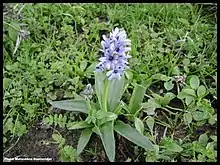Hyacinthoides lingulata
Hyacinthoides lingulata is a species of bulbous plant that lives in North Africa, from Morocco to Tunisia.[2] It is widespread in short grass and agricultural fields, flowering in autumn when the rains begin. The flowers are generally paler than the common bluebell (Hyacinthoides non-scripta), but have a similar scent.[3] Its leaves are not fully hardy, and it is usually grown under glass in the British Isles, where it requires a dry rest in summer and watering from early September until it dies back in May.[3]
| Hyacinthoides lingulata | |
|---|---|
 | |
| Scientific classification | |
| Kingdom: | Plantae |
| Clade: | Tracheophytes |
| Clade: | Angiosperms |
| Clade: | Monocots |
| Order: | Asparagales |
| Family: | Asparagaceae |
| Subfamily: | Scilloideae |
| Genus: | Hyacinthoides |
| Species: | H. lingulata |
| Binomial name | |
| Hyacinthoides lingulata | |
References
- "Search for Hyacinthoides lingulata". World Checklist of Selected Plant Families. The Board of Trustees of the Royal Botanic Gardens, Kew. Retrieved 2011-07-05.
- Michael Grundmann; Fred J. Rumsey; Stephen W. Ansell; Stephen J. Russell; Sarah C. Darwin; Johannes C. Vogel; Mark Spencer; Jane Squirrell; Peter M. Hollingsworth; Santiago Ortiz; Harald Schneider (2010). "Phylogeny and taxonomy of the bluebell genus Hyacinthoides, Asparagaceae [Hyacinthaceae]". Taxon. 59 (1): 68–82. doi:10.1002/tax.591008.
- Dave Riley (2011). "Show Reports : Newcastle". The Alpine Gardener. Alpine Garden Society. 79 (2): 299.
This article is issued from Wikipedia. The text is licensed under Creative Commons - Attribution - Sharealike. Additional terms may apply for the media files.